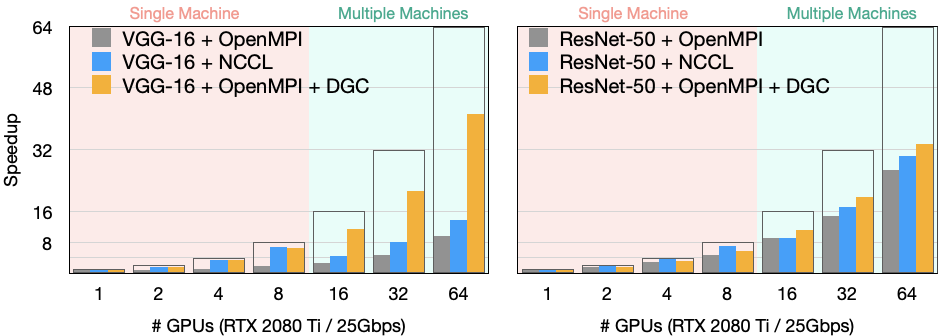Deep Gradient Compression [arXiv]
@inproceedings{lin2018dgc,
title={{Deep Gradient Compression: Reducing the communication bandwidth for distributed training}},
author={Lin, Yujun and Han, Song and Mao, Huizi and Wang, Yu and Dally, William J},
booktitle={The International Conference on Learning Representations},
year={2018}
}
We release the PyTorch code of the Deep Gradient Compression.

Figure 1. Deep Gradient Compression (DGC) can reduce the communication bandwidth (transmit less gradients by pruning away small gradients), improve the scalability, and speed up distributed training.


Figure 2. : DGC maintains accuracy: Learning curves of ResNet (the gradient sparsity is 99.9%).

Figure 3. DGC improves the scalability: speedup measured on NVIDIA TITAN RTX 2080Ti GPU cluster with 25 Gbps Ethernet.
The code is built with following libraries (see requirements.txt):
The core code to implement DGC is in dgc/compression.py and dgc/memory.py.
- Gradient Accumulation and Momentum Correction
mmt = self.momentums[name]
vec = self.velocities[name]
if self.nesterov:
mmt.add_(grad).mul_(self.momentum)
vec.add_(mmt).add_(grad)
else:
mmt.mul_(self.momentum).add_(grad)
vec.add_(mmt)
return vec- Sparsification
importance = tensor.abs()
# sampling
sample_start = random.randint(0, sample_stride - 1)
samples = importance[sample_start::sample_stride]
# thresholding
threshold = torch.min(torch.topk(samples, top_k_samples, 0, largest=True, sorted=False)[0])
mask = torch.ge(importance, threshold)
indices = mask.nonzero().view(-1)We use Horovod to run distributed training:
- run on a machine with N GPUs,
horovodrun -np N python train.py --configs [config files]e.g., resnet-20 on cifar-10 dataset with 8 GPUs:
# fp16 values, int32 indices
# warmup coeff: [0.25, 0.063, 0.015, 0.004, 0.001] -> 0.001
horovodrun -np 8 python train.py --configs configs/cifar/resnet20.py \
configs/dgc/wm5.py configs/dgc/fp16.py configs/dgc/int32.py- run on K machines with N GPUs each,
mpirun -np [K*N] -H server0:N,server1:N,...,serverK:N \
-bind-to none -map-by slot -x NCCL_DEBUG=INFO \
-x LD_LIBRARY_PATH -x PATH -mca pml ob1 \
-mca btl ^openib -mca btl_tcp_if_exclude docker0,lo \
python train.py --configs [config files]e.g., resnet-50 on ImageNet dataset with 4 machines with 8 GPUs each,
# fp32 values, int64 indices, no warmup
mpirun -np 32 -H server0:8,server1:8,server2:8,server3:8 \
-bind-to none -map-by slot -x NCCL_DEBUG=INFO \
-x LD_LIBRARY_PATH -x PATH -mca pml ob1 \
-mca btl ^openib -mca btl_tcp_if_exclude docker0,lo \
python train.py --configs configs/imagenet/resnet50.py \
configs/dgc/wm0.pyFor more information on horovodrun, please read horovod documentations.
You can modify/add new config files under configs to change training settings. You can also modify some trivial configs in the command:
python train.py --configs [config files] --[config name] [config value] --suffix [suffix of experiment directory]e.g.,
horovodrun -np 8 python train.py --configs configs/cifar/resnet20.py \
configs/dgc/wm5.py --configs.train.num_epochs 500 --suffix .e500Here are some reproduce results using 0.1% compression ratio (i.e., configs.train.compression.compress_ratio = 0.001):
| #GPUs | Batch Size | #Sparsified Nodes | ResNet-50 | VGG-16-BN | LR Scheduler |
|---|---|---|---|---|---|
| - | - | - | 76.2 | 73.4 | - |
| 8 | 256 | 8 | 76.6 | 74.1 | MultiStep |
| 16 | 512 | 16 | 76.5 | 73.8 | MultiStep |
| 32 | 1024 | 32 | 76.3 | 73.3 | MultiStep |
| 32 | 1024 | 32 | 76.7 | 74.4 | Cosine |
| 64 | 2048 | 64 | 76.8 | 74.2 | Cosine |
| 64 | 2048 | 8 | 76.6 | 73.8 | Cosine |
| 128 | 4096 | 16 | 76.4 | 73.1 | Cosine |
| 256 | 8192 | 32 | 75.9 | 71.7 | Cosine |
- Backend: We currently only support OpenMPI backend. We encountered some errors when calling
allgatherusing NCCL2 backend:allgathered data are random data once in a while; if we setCUDA_LAUNCH_BLOCKING=1for debugging, everything works well. - #Sparsified Nodes: We currently treat each GPU as an independent node. However, communication is rarely a bottleneck within one machine. A better strategy should be performing
allreducedense gradients intra-machine andallgathersparse gradients inter-machines.- For accuracy/convergence verification, we can simulate this by setting
configs.train.num_batches_per_stepto desired #GPUs per machine (see accuracy table for batch size = 4096/8192).
- For accuracy/convergence verification, we can simulate this by setting
- Sparsification Granularity: We naively perform fine-grained (i.e., element-wise) top-k to select gradients, and thus the communication will suffer from increased
allgatherdata volume as #nodes increases.- Sun et.al. modified the process with coarse-grained sparsification: gradients are partioned into chunks,
allreducethe gradient chunks selected based onallreduced L1-norm of each chunk, which gets rid of theallgatherand solves the problem.
- Sun et.al. modified the process with coarse-grained sparsification: gradients are partioned into chunks,
- Data Encoding: We did not perform any data quantization/encoding before transmission. Data encoding can further reduce data volume.
- Overhead: Performing sparsification (esp. adapting thresholding) in C/C++ may further reduce the DGC overhead.
This repository is released under the Apache license. See LICENSE for additional details.
- Our implementation is modified from grace which is an unified framework for all sorts of compressed distributed training algorithms.